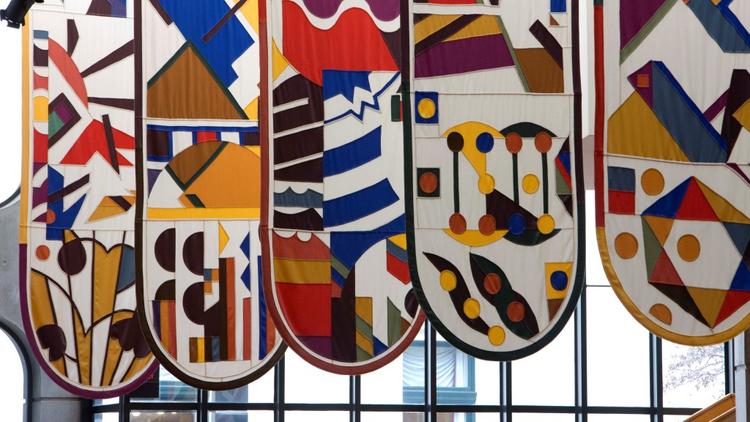Public Art is on display at Wellington Heritage Week 2021, 25–31 October, with Public Art Talk - Gordon Crook Banners hosted by the Wellington City Council’s City Arts and Events Team, and Memories of Newtown's Adventure Playground 1974 hosted by the Newtown Community & Cultural Centre.
Wellington City Council’s City Arts and Events Team are hosting its talk on Saturday 30th of October about the twelve large banners and ten enormous wall hangings created by Gordon Crook. Crook was born in England, and taught textile design at London’s Central School of Art. After a successful commission to the New Zealand embassy in Washington D.C., he was commissioned to make these banners and hangings for the under-construction Michael Fowler Centre in the early 1980s. They still exhibit in the Centre’s entrance and are his largest work.
Laura Woodward, City Art Collection Registrar at Wellington City Council, says that the art work “reflects the colourful expression and abstract creative thinking of Wellingtonians both inside and outside the auditorium” and are part of the “life and jubilation of concerts [in the Centre] whether they be classical or rock music”.
Laura highlights the work’s connection with locations and organisations across the country. “The Michael Fowler Centre was modelled on the pre-existing Christchurch Town Hall, which makes me wonder if Crook took a trip to Christchurch to see the building’s smaller doppelganger to take inspiration from its arches and structural columns”, she says. She also considers it relevant to Cuba Street, as the work sits at the street’s lower entrance, as it shares Cuba Street’s sense of surprise and delight. Gordon Crook’s work is held nationwide by Auckland Art Gallery, Christchurch Art Gallery, Victoria University of Wellington, and private collectors.
Newtown Community & Cultural Centre is hosting a special exhibition of Newtown’s former Adventure Playground that photographer John McWilliam’s captured in the 1970s. The exhibition runs from the evening of Friday 29th and through Saturday 30th of October. McWilliam’s remembers it as an interactive artwork that brought the community together, both symbolising and creating the vibrant Newtown community. Children would “build structures with tools and timber, to draw and paint, or just to sit quietly and read” and “there was usually milk, tea and coffee available, sometimes biscuits, and on really lucky days, pancakes”, he recalls. It was on the corner of Constable Street and Daniell Street and existed until approximately 1976.
McWilliam’s and others found social and philosophical liberation in its climbing frames, ropes, and the children’s unstructured play. “It brought people of different races together who normally would have been unlikely to mix” and encouraged friendships and discussion between children and parents alike, he adds. “For many in the community, it proved once again, that they had no real control over the authority that governed much of their lives. Others realised that to change this required getting together with others in the community and talking about how they could affect change, even in small ways, or by taking political action at the ballot box”.
McWilliams is retired now and admits he is “too old to be running around photographing the world”, but he desires that others see these images to learn about the social impact of this unique playground. He will host a kōrero about the playground at 6pm–9pm on Friday 29th of October at the Centre and copies of his photographs will be available in his new book.
There are over 60 events in Wellington Heritage Week 2021, 25–31 October. It is a community-run festival for the Wellington region. Visit wellingtonheritageweek.co.nz for the full festival programme - please check the event listings for booking information. Some events require prior booking. Also, view our Heritage Blog for more articles and itineraries - available on the festival’s website.
Originally published by Public Art Heritage Aotearoa New Zealand.
